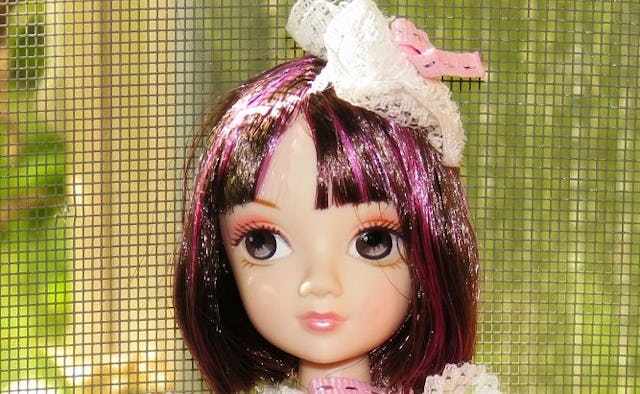That Time I Kind of Liked Other People's Racism

For the purposes of this article, we’ll call my husband Sully. Sully is Italian and Irish, born and raised outside of Boston. He is, in other words, white. In the course of his daily activities—dropping the kids at school, riding the subway, reaping the rewards of the Anglo-Saxon patriarchy—he brushes up against many, many people who are just like him. As far as I can tell, they don’t have a special handshake or nod or overlord fist bump, but I may be wrong.
Half-Asian, half-white people like me, on the other hand, have a thing. We see each other, and there’s a vibe, a subtle nod and silent acknowledgement, a “Hey, I see your halfness, and I get it. My white uncle once called me a Chinaman too.” I call it That Hapa Moment.
“Hapa” is short for the Hawaiian expression “hapa haole,” which technically means half-white but refers to people who are half-Asian. Back in the ’70s, being half-Asian was much more novel than it is today. As a kid and teenager, I got a lot of “Where are you from?” and “What are you?” as well as my personal favorite, “Ni hao. Do you cook Chinese food?” (California, Homo sapien, and No, asshole).
As a little kid, I found these queries uncomfortable, but also a source of pride. It made me feel special, like someone actually noticed me. Since so many people I encountered felt it necessary to mention my Asian-ness, I began to wear it as a badge of honor. Most people in my orbit were white, so they were totally ordinary, the norm—which, to me, meant they were boring. They shopped in the sugar cereal aisle and ate tuna casserole. My family went to Chinatown for dim sum, but also grilled steaks and ate spaghetti. We were more interesting. Plus, I really loved my Chinese-American side of the family, so it was cool.
Then puberty hit and things got weird. Male strangers constantly felt compelled to use my “slanted” eyes as an icebreaker, and they usually followed up with, “My last girlfriend was Japanese.” The sexual and sexist overtones were stomach-turning and infuriating…not to mention just plain dumb (example: that time a bedraggled old white man asked me if my boyfriend “liked Chinese food,” which made me want to hose myself down with lye).
It would never have occurred to me to ask Sully, when we first met, if he boiled a mean potato or was a made man (although, to be fair, I do dish out my fair share of drinking jokes). No one has ever told him he’s exotic or fetishized him (except for that one time on a boys’ weekend in Montreal, but he doesn’t like to talk about that…). On the other hand, though, his name is seriously Irish—it only lacks the “O’ “—but he looks Italian and identifies more with the Italian side of his family. And yes, he makes a fantastic red sauce. The difference is that he can choose to make these facts known about himself, assuming anyone actually cared. But hapas of a certain age grew up without a choice—people made up their own “facts” about us, often before we even opened our mouths.
When I encounter another half-Asian 30- or 40-something—another parent at my kids’ school, perhaps—my mind doesn’t get flooded with stupid questions. I don’t assume they speak another language or grew up on an island beset by typhoons and tidal waves. My first thought is that they probably grew up in Jersey or Michigan or Orange County, like my other friends. But I do feel a kinship, a solidarity of experience. Maybe a high school boyfriend once asked them if they wanted to “order some slope chow” for dinner. Maybe an old Vietnam vet once leaned into their car and called them a “gook” (to which I fought the urge to reply, “Technically I’m a chink, but thank you for your service”).
These days it’s not such a big deal. Hapas are a dime a dozen, and—shocker!—in some Caucasian/white couples, the man is the Asian one! Cab drivers, who for whatever reason used to be the worst offenders, barely acknowledge me anymore…which may be as much a function of my aging out of the “subservient Asian nympho” category as it is indicative of a radical social shift. For my kids it’s all math. They’re just like all their friends—a regular pu pu platter of mixed ethnicities. They all like to tout their fractions, like, “I’m a quarter Chinese, a quarter Italian, a third Martian,” etc. They think it’s like saying you have 13 Twilight Sparkles and 17 pieces of redstone dust in Minecraft.
We recently spent a week with my Chinese-American extended family. Afterwards, my (Jewish, white) friend jokingly asked my kids, “So, did you guys see a lot of Chinese people on your vacation?” My son just looked at her with a totally confused expression on his face and said, “Huh?” He hadn’t even noticed. Everyone was just Auntie Something or Cousin So-and-So to him. He honestly couldn’t differentiate among the full Chinese, the hapas, and the Indian or Filipino or redheaded white cousins by marriage. It was all one big post-racial family stew.
So, that’s progress, right? No one will say, “No starch, please,” to my son, thinking they’re being hilarious. My daughter probably won’t hear many lewd, thinly veiled “Oriental massage” references. But they’ve also got so many ingredients mixed into their little genetic smoothies that they’ve come out almost…neutral. They won’t have anything—other than their accomplishments, personality and skills—that makes them feel a little bit special. We’re gaining something, sure. But maybe we’re losing something too.
photo: flickr
This article was originally published on